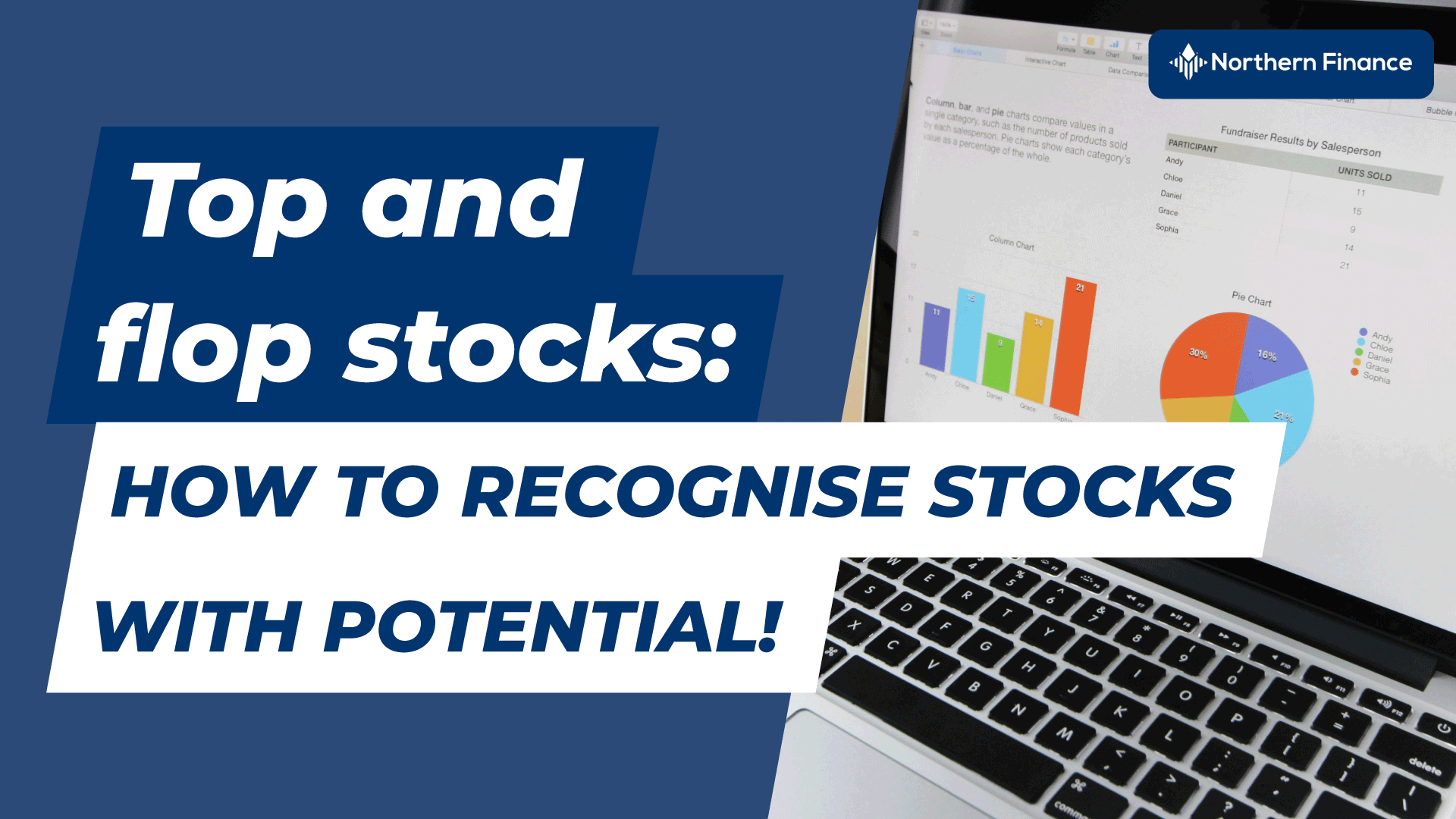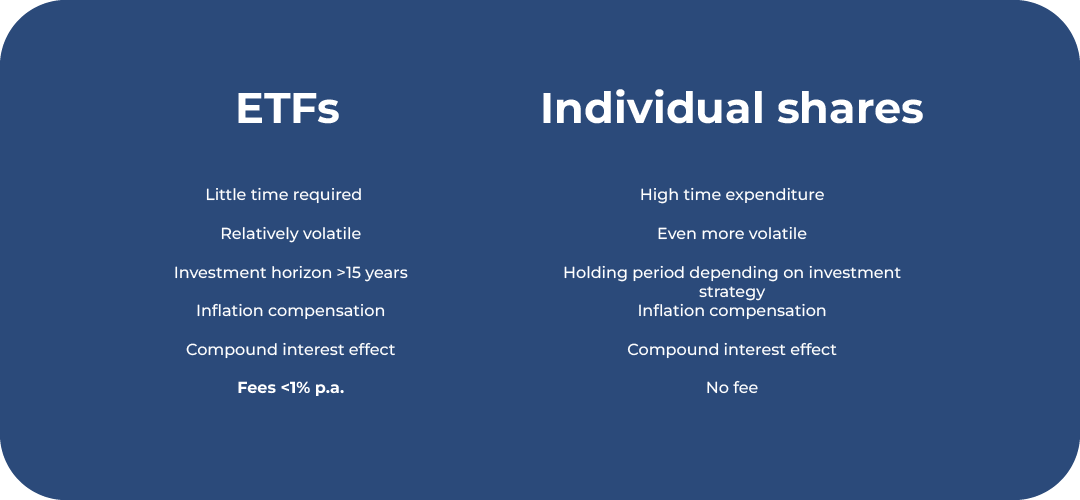Top flop stocks 2025


Are you a beginner and want to invest in company shares, but are afraid of buying bad company shares? In this article, we will show you what top flop stocks are and what you should look out for if you want to invest money in such a security.
In brief:
- We show you what company shares are, what types there are and exactly how they work
- You can find out the difference between top and flop shares in this article
- Are flop securities really only negative or do they possibly offer opportunities?
- You should consider these aspects if you want to invest successfully in securities and avoid loser stocks
- These reasons speak in favour of investing in company shares and investing money for the long term
What are stocks?
As a shareholder, you buy a share in a company, become a co-owner of the respective group and have a financial stake. You lend your capital to the company and receive a security in return.
Good to know:
This security gives you various rights. For example, some companies pay out their profits to their own shareholders in the form of dividends. While part of the profits are often paid out as dividends, the remaining part can be set aside as a financial cushion or invested in projects.
Some investors pursue a so-called dividend strategy and look for the top dividend shares, also known as dividend kings. These investors often aim to build up a passive income and benefit from regular income.
Some shares also allow you to participate in the Annual General Meeting and use your vote to make important decisions:
- Major shareholders often have a double-digit percentage stake in the stock corporation and can therefore exert the most influence
- Participation in an Annual General Meeting enables shareholders to influence company policy
Small shareholders are more interested in earning money with shares and are often less interested in voting. Instead, they buy company shares in the hope of benefiting from a future increase in value. The aim is to buy a security as cheaply as possible and sell it at a higher price at a later date.
These types of shares are available
On the one hand, a distinction is made between registered shares and bearer shares. Registered shares bear this name because their owners are entered in a register. The companies therefore know exactly who owns which amount of shares. Normally, the bank automatically transfers the owners to the register.
- Anyone who owns a registered share but is not entered in the register cannot participate in the Annual General Meeting
- If you are registered as the owner, the previous owner will be removed from the list
- A fee may be charged for the transfer
No register is created for bearer shares. Voting rights at the Annual General Meeting are automatically transferred to the person who currently owns the security. Groups therefore have the disadvantage that they lack a detailed overview of the investor structure.
Another distinction relates to ordinary shares or preference shares. An ordinary share allows you to participate in the Annual General Meeting, but you receive a lower dividend. With a preference share, shareholders receive a higher dividend, but no right to influence company policy.
Why invest in shares?
Securities of this type are among the highest-yielding forms of investment. Conventional investments such as building society savings contracts or call money accounts hardly generate any interest. If you are looking to achieve high returns, company shares offer you an attractive opportunity.
The dividend strategy already mentioned also has advantages. With the help of regular income, you can build up a passive income and further increase the money you have available in the long term.
This form of investment offers you a high degree of flexibility. You have a huge selection of securities that are suitable for different strategies and investor types. Regardless of whether you are more security-orientated or like to take risks – everyone can find suitable securities and build up an individual strategy.
- Would you like to invest for the long term and build up your wealth? The strategy of value investing could be worthwhile for you.
- Are you more security-orientated, but still want to generate returns? Then take a look at shares or ETFs!
- Do you like taking risks and want to take a close look at securities and prices? You could opt for a mix of value investing and trading.
Securities also offer protection against inflation. Inflation can devalue your assets in the long term. Over time, you will receive fewer and fewer products and services for the same amount of money. When choosing your investment, make sure that you can compensate for inflation as well as possible.
Good to know:
Another advantage is that you don’t need a lot of money to get started. For example, you can set up a monthly savings plan for shares with a small savings amount and work on building up your assets automatically. Take a look at a comparison of share savings plans to find the best option for you.

What are top flop stocks?
Top company shares and flop securities: These are two contrasting types of shares on the market. Some have impressed with great price developments, while others have lost confidence or have had to struggle with difficulties.
Basically, top company shares are characterised by their financial strength and the fact that they have enjoyed great success in recent years. As a result, they have established themselves on the market and are popular with investors, as they are often seen as safe shares.
- Solid strategies for management
- Strong market position
- Innovative ideas for your own business
Flop company shares, on the other hand, are the losers of a year and have suffered losses. It could be that things went worse for a particular sector in a given year due to political or social changes. Corporate scandals, loss of confidence or wrong decisions can also cause such circumstances.
Although such securities appear quite unattractive at first glance, they should not be overlooked as they also offer opportunities. Unlike very popular securities with high prices, they offer a low price for beginners. In addition, they often have high potential if the company is able to recover from its difficulties.
| Top securities | Flop securities | |
| Advantages | Consistent growth possible Lower risk Offer reliability and stability for investors | High growth potential if the Group recoversLow entry price |
| Disadvantages | High entry price | Time-consuming research and analyses to identify opportunities |

As we have seen, it is difficult to invest in flop securities. This requires extensive research and analysis to find out whether the security is worthwhile and offers opportunities for the future or not. You probably want to invest money correctly and avoid mistakes. In the following, we will look at what you should pay attention to when buying shares.
Define investment goals
Before you start investing in securities, you should find out what type of investor you are and what your goals are. What exactly do you want to do with the money you invest? Do you want to provide for your family, provide for your old age, save for a house? Or do you not need the money at the moment and want to invest it to earn a return and not leave it in an overnight money account?
Attention!
Define your precise investment goals. How much money do you need in the future to achieve your goal? When do you want to withdraw your money from the custody account? How much do you need to save each month to achieve your goal?
These answers often result in strategies that you can use for investing. For example, if you are long-term orientated and your goals lie far into the future, long-term wealth accumulation through value investing is particularly suitable.
Top flop shares: determine risk profile
People have different characters and cope with risks differently. Some panic when their own portfolio posts negative figures. Others can remain very calm and composed even when the risks are high.
Good to know:
Company shares are only safe investments if certain rules are adhered to, such as sufficient risk diversification. Nevertheless, they are subject to fluctuations and come with various risks. For example, the risk of loss is comparatively high if you only invest in very few individual shares.
Find out how much risk you are prepared to take. If you are more security-orientated, for example, flop company shares are not suitable for you, as their future is often rather uncertain. They offer attractive opportunities for those who can deal with uncertainty and have sufficient expertise to analyse the companies in detail.
Extensive research and knowledge building
This point is probably the most important. Before you start investing in company shares, a fundamental process of building up knowledge is necessary. You then need more time to get to know and analyse the individual companies that interest you.
Various key figures are used to value company shares. There are quantitative and qualitative factors that are taken into account. Quantitative factors are, for example, fundamental data and balance sheets. Qualitative factors, on the other hand, are management, competitors or government regulations.
If you want to identify possible flop company shares of recent years with interesting opportunities and future prospects, you need sufficient, well-founded knowledge to gain a realistic overview.
If you don’t enjoy dealing with such topics and diving deep into research, you could start looking into ETFs. It’s an easy-to-understand, high-yield investment that requires less effort.
| Examples | Source | |
| Quantitative factors | Price/sales ratio Price/earnings ratio Cash flow Debt Earnings margin | Balance sheets Fundamental data Financial reports |
| Qualitative factors | Customer reviews Management CVs New products and plans for the future | Government rules Products Management Competition |
Entry and exit time
Depending on how you invest, the entry and exit times play an important role in share trading. If you have set up an automated monthly savings plan, you don’t need to worry about this.
Even if you are investing for the long term, these points in time become negligible or less decisive than for short-term traders. If, on the other hand, you are more willing to take risks, poor entry or exit times can significantly reduce or improve your returns. Traders try to actively exploit price fluctuations and make a profit from them.
Technical analysis and fundamental analysis of shares
The two most important strategies for assessing company shares and their future development are technical analysis and fundamental analysis. We will give you a brief overview of how the two strategies work and which key figures are taken into account.
Supporters of technical analysis assume that all important information is contained in the price of the company’s shares. Therefore, prices or charts and their changes are analysed closely.
- Technical analysis is based on recurring chart patterns
- It analyses whether investors invest or rather withdraw their money
- Current information and past data are used to make a short to medium-term forecast of how prices will develop
Fundamental analysis is a more holistic and comprehensive approach. Followers try to determine the true value of a company’s shares, focussing not only on price performance but also on various key figures.
For example, investors look at various factors that can influence the price. Various pieces of information are taken into account, such as profit forecasts, balance sheets, growth and many more.
A so-called ‘intrinsic value’ is determined, which describes how much the company share is worth. This figure is compared with the current price of the company share:
- This makes it possible to recognise whether the security is overvalued or undervalued
- Undervalued company shares have potential for the future as they offer growth opportunities
- They are suitable for long-term investing
Professional traders use tools and models. Private investors often do not have access to such software, but can use these analyses to gain a realistic overview and assess whether an investment is worthwhile or not. Traders tend to rely on technical analyses, long-term investors on fundamental analyses.

Reduce risk – never put all your eggs in one basket
Extensive research and the purchase of a company share are a good start. However, it shouldn’t stop there. If you invest all your assets in a single company, you are taking a big risk. If this company gets into difficulties and goes bankrupt, you will lose all your money.
Attention!
Therefore, never put all your eggs in one basket, but invest in many different companies from different countries and sectors. This approach is called diversification and can balance out the risks in your portfolio.
This also applies to your investment. The different asset classes come with different advantages and disadvantages. Diversify your investments to reduce the risks.
Top flop shares: beware of ‘insider tips’
The internet offers excellent opportunities to learn more about topics such as finance and investments. However, there are also numerous supposed experts who want to sell you their expensive courses or insider tips that you can use to get rich in a short space of time.
It makes sense to be cautious with such providers. It is important to check the reliability of providers. Do they provide balanced information and include pros and cons? Do they show you that investing properly involves work and requires knowledge?
Only invest what you don’t need
Company shares can be an excellent way to achieve long-term financial goals. However, you should only invest money that you will not need in the near future.
If you have to take your money out of your investment prematurely, you may have to sell when prices are expensive. This can result in losses, which can lead to a setback in terms of your financial goals.
- To avoid such situations, it is advisable to build up an emergency fund
- This serves as a financial reserve for difficult times, such as unforeseen expenses
- You can fall back on this cushion if your car needs to be repaired or electrical appliances need to be replaced
- The emergency fund should contain 2 to 3 net salaries
Note costs
If you want to make the most of your investments and achieve high returns, you should keep an eye on your costs and minimise them where possible. If you decide to buy a company share, you may incur the following costs, for example:
- Order fee
- Selling costs
- Trading centre fee
- Transaction costs
Good to know:
Read the costs involved carefully before you buy. Internet portals offer free comparisons so that you can see which bank offers you the best deal so that you can keep your costs as low as possible and don’t have to reduce your return.
Company shares offer you the opportunity to become a co-owner of a group and achieve high returns in some cases. You can also use a dividend strategy to build up a passive income or protect your money against inflation.
Basically, there are popular top and less popular flop stocks that have suffered losses in recent years. The reasons for this are numerous, but these company shares can also harbour opportunities. They have the advantage that the entry prices are much more favourable. Many of them offer great potential for the future and are working intensively on improvements.
We have also given you some tips on how to invest in company shares successfully and avoid buying bad company shares. If you inform yourself sufficiently and build up a sound basic knowledge, nothing will stand in the way of your wealth accumulation! Find out more about ‘The 10 best shares’ or ‘Share savings plan smart brokers’ here.


